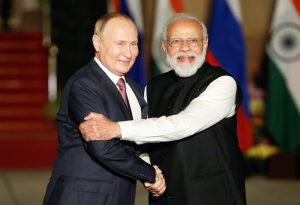The U.S. Treasury Department imposed sanctions on dozens of Russian banks last week, causing the Russian ruble to plummet in value and forcing the Russian central bank to step in to support the currency.
Shortly after Russian troops invaded Ukraine, the ruble fell to $114 against the dollar, its lowest level since March 2022.
The Central Bank of Russia (CBR) said it would stop foreign investors from buying rubles on the national currency market for the remainder of this year “to reduce volatility in financial markets.”
Also read: Adani case exposes flaws in India’s clean energy rollout
The central bank’s move helped the ruble rise to around 110 against the dollar earlier on Thursday, but some commentators said the ruble was in “free fall” and the central bank’s intervention was “to contain panic”.
“Close followers of Russian geopolitics and macroeconomics say the ruble’s depreciation is a sign that Moscow’s economic situation is deteriorating rapidly.” CNBC said.
“The central bank has raised interest rates to 21 per cent but has so far failed to curb price rises, with inflation reaching 8.5 per cent in October, while prices for basic food items such as butter and potatoes have also risen sharply over the past year,” it said .
last week, U.S. Treasury Department’s Office of Foreign Assets Control (OFAC) Sanctions were imposed on Gazprombank as well as more than 50 Russian banks with international connections, more than 40 Russian securities registration agencies and 15 Russian financial officials.
The statement said the move was aimed at “restricting Russia’s use of the international financial system to further advance the war against Ukraine” and “weakening Russia’s war machine.”
OFAC also issued an alert about sanctions risks related to the Russian Financial Flow System (SPFS), which the Kremlin uses to evade sanctions.
“This sweeping action will make it more difficult for the Kremlin to evade U.S. sanctions and fund and equip its military,” U.S. Treasury Secretary Janet Yellen said.
The notice describes Gazprombank as a conduit through which Russia purchases military supplies for its war effort, noting that Moscow “uses Gazprombank to pay its soldiers salaries, including combat bonuses, and to compensate those killed in Putin’s brutal war against Ukraine.” Families of Russian soldiers.
Australia, Canada, New Zealand and the UK have already sanctioned Gazprombank (GPB). But the United States did not impose sanctions beforehand, allegedly because GPB is used by European entities that buy Russian gas.
Other institutions hit by the US move include Luxembourg-based GPB International Bank, GPB Financial Services Hong Kong Ltd, Cyprus-based GPB Financial Services Ltd, GPB-DI Holdings Ltd, Gazprombank (Switzerland) Ltd and Headquarters South Africa-based GPB Africa and Middle East Pty Ltd. are both described as wholly-owned subsidiaries of GPB.

The U.S. move is seen as a belated move by the Biden administration to increase pressure on the Kremlin before Donald Trump returns to the White House.
Russia’s economy grew during the war as oil and gas exports surged to countries such as China and India, which took advantage of discounts offered by Moscow, but the International Monetary Fund warned of a sharp slowdown in 2025. Because of factors such as declining consumption.
Kremlin spokesman Dmitry Peskov played down the impact of the currency devaluation, saying ordinary Russians still received their salaries in rubles.
But economists point out that the latest sanctions make it harder for Russia to trade with foreign countries as foreign exchange sources dry up, the ruble has fallen 35% since August, and inflation is hammering the domestic economy.
A list of banks and officials affected by the U.S. action can be found here.
See also:
Russia calls Trump’s win ‘useful’, China ‘continues to respect’
Russia wants to increase coal exports to power-hungry India
US says China provided deadly aid to Russia in Ukraine war – FT
Ukraine Zelensky urges India to cut Russian oil imports – UP
China condemns latest US ban on 42 companies linked to Russia’s war
US warns China of sanctions: ‘helping Russia threaten Europe’
Despite sanctions, 90% of chips used in Russia are still supplied by China
As relations deepen, Chinese and Russian companies have reached multiple deals
Chinese loans to Russia quadruple since Ukraine war – FT
20 of the 300 Chinese companies sanctioned by the United States over the Russian war
Big banks withdraw, Sino-Russian trade “goes underground”




